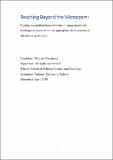Reaching beyond the microcosm: Casting recognition-based systems of engagement and exchange as essential for the appropriate development of alternative agriculture

View/
Date
2020-06-17Author
Fitzsimons, Tom
Metadata
Show full item recordUsage
This item's downloads: 309 (view details)
Abstract
This thesis seeks to identify recognition-based systems of engagement and exchange within current alternative food networks and hopes to demonstrate how these fluid micro-structures are fundamental to the development of alternative farming in an Irish context. The author confronts prevailing discourse by proposing that internal structures of mutual recognition rather than the market logic of productivist hybrids underpin successful alternative farms. By adopting a Vygotskian developmental approach, necessarily grounded in communities of practice, the thesis sees the expansion of alternative farming in the social-cultural context of scaling out rather than in the clinical economic context of scaling up which is currently supported by the Irish state. Relying on Honneth’s recognition theory and theories of extended cognition as an analytical starting point, a hands-on engagement involving volunteering, participatory observation, and informal interviewing was seen as the immersive component of the research strategy. Qualitative methods included typical ethnographic research tools but also elements of grounded theory, critical theory and cognitive ethnography. The results of the research revealed that farmers who are more strongly alternative are more likely to adopt a recognitional stance and that this has the effect of grounding social and human capital but also helps to prevent loss of resources to the mainstream and inhibits the type of allegiance switching commonly described as entrepreneurship or diversification. Recommendations for further scholarly work includes re-evaluating the term ecological entrepreneurship in the light of the biological farming approach, popular among a growing number of conventional Irish farmers, and the suggestion that conducting a systematic study of the forms of recognition which have emerged during the course of this research may open up new theoretical frontiers for rural sociologists

